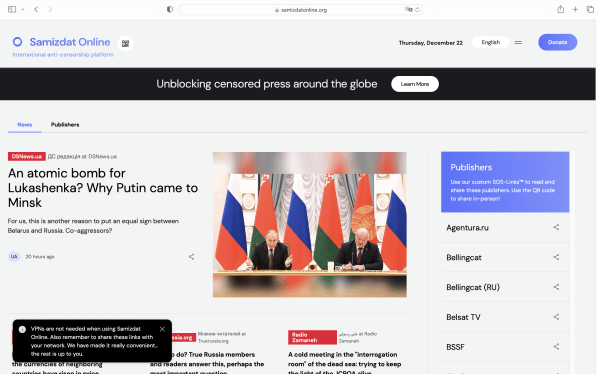How Samizdat Online is beating censors with random URLs
The internet has never been more censored, and not in the “Twitter Files,” culture-war way. Thousands of websites are now wholly inaccessible inside Russia and occupied Ukraine, including Facebook, Instagram, and Twitter, and foreign media like The New York Times and the BBC. In Iran, the government has been shutting down the internet by disrupting foreign social media platforms, throttling internet service, and blocking IPs, encrypted DNS services, and mobile data. Protests in China over COVID-19 lockdowns pushed the Great Firewall to its limits last month and led the government to impose new restrictions on censorship-circumvention tools like VPNs, and instructed tech firms to scrub any content related to jumping the firewall.
Samizdat Online, a project co-founded by Yevgeny Simkin, a Montreal-based web developer and writer, takes a non-VPN approach to bypassing internet censors. Simkin’s effort keeps copies of banned content at alternate URLs that haven’t been blocked, allowing internet users in countries like Russia, Iran, and China to circumvent censors without the use of a virtual private network or other additional software.

Simkin, who was born in Russia, was motivated by the country’s invasion of Ukraine and its digital clampdown, and took inspiration from the underground web of samizdat, the homemade and pirated media that helped power a dissident diaspora in a previous era. “In the sixties and seventies, people would smuggle in audio tapes and magazines and books, and they would personally make home copies and then distribute those on, and people would make more copies and on and on,” he says. “The ethos of samizdat here is as it was in Soviet Russia.”
A central homepage, at samizdatonline.org, features a list of mirrored outlets, under a tab labeled “Publishers,” along with a hand-picked slate of recent news headlines from blocked websites in five languages (English, Russian, Ukrainian, Farsi, and Belarusian). Samizdat has official partnerships with a handful of Russian and Belarussian publications, but it also mirrors the homepages and news stories from an assortment of other publications that have been blocked by internet authorities, including the BBC and Iran’s Radio Farda. (To afford all of this, he’s seeking investment and donations, as well as grants from internet freedom organizations.)
The website is not related to another anti-censorship project called Samizdat that launched last month, with a mobile app that allows users to read stories from five Russian outlets. That app uses links to versions of news stories hosted directly on Amazon Web Services URLs that governments are hesitant to block, an anti-censorship strategy sometimes called “collateral freedom.” Samizdat uses a similar approach for hosting its content, but it boasts an extra layer of protection: an endless supply of gobbledygook web addresses. If any of those addresses are blocked (or if Amazon or any other web host removes it), Samizdat can switch to another random address and server, part of the weird cat-and-mouse game that defines the fight for freedom online. “We can always spin up another URL,” Simkin says.
Fast Company recently spoke with Simkin about how his operation works, why he does it, and the need to find more sources of funding for anti-censorship technology, especially when it’s never been needed more. This conversation has been edited for length and clarity.
Fast Company: Technically, how does Samizdat Online work?
Yevgeny Simkin: Unless somebody comes to samizdatonline.org, which really hasn’t been promoted anywhere, the way that they’re finding us isn’t us. They’re being handed a link on Telegram, in an email. We call this an SOS link. On the back end, we have a few servers running services that are identical everywhere, but that are hosted on a ton of different IP addresses so that nobody can find an IP range and just shut it down. For any given webpage a user requests, the system strips out all of the underlying URLs, replaces them, generates new URLs for every single link, so that you can continue your journey.
If users do come to our homepage, they’ll see some recent news stories we’re featuring. We’ve got five native speaking journalistic people who communicate every day, pick the stories, and then translate the headlines into five languages. We take the time to translate the headlines and the ledes, because Google Translate and other AI services do an absolutely horrendous job at translating headlines, because headlines try to cram as much information into as few words as possible. And once you move from Farsi to Belarussian, forget it. So, we’re doing that manually on the homepage.
But once you click on the story, if you just use Google translate, the story actually translates pretty well. We’re mostly picking the stories that get featured, but anyone can contact us on the site to suggest other outlets and stories.
FC: How do you get your domains?
YS: We generate random strings that are completely arbitrary and register domains based on those strings. Nobody will ever want those domains. We also agreed to a deal with a Ukrainian registrar who is going to give us a huge discount on domain registration. And we’re hoping to ask people to donate their existing domains, because everybody and their grandmother has registered five domains at some point.
We actually have technology currently in Russia and Belarus—we don’t have something in Iran yet, but we will soon—that actually pings the domains from there. And the moment it notices that a domain is unreachable, we just throw it out and generate a new one. So, there’s eventually thousands of domains, hundreds and hundreds of servers. That actually helps us in the sense that if, at some point somebody implements a different kind of blockade where they stop letting Western registrars register new domains in their rolls, they still have millions of these existing domains already sitting in their DNS rolls, which they would never know to go and purge. So, that just creates another backbone to continue operating in that way.
The servers can be spun up anywhere—it’s not AWS or any other cloud provider specific, which is by design. Eventually, we want people/organizations to run these on our behalf so that we can get thousands of these spun up around the globe. Initially, we’re tending to them all on our own.
FC: Part of the benefit of Samizdat Online is users don’t need a VPN to see blocked news. But are the people looking for this news already using a VPN?
YS: A VPN is a very intentional, two-directional technology, where I, as the user, have the intention to go and find something, and I go and I find it, and then I read it, and that’s it. That’s the extent of the relationship. The moment I want to share that content with somebody else, they also have to be on a VPN. But once you have one of our links, those can be opened by anybody without any additional technology.

People say that everybody who wants this content already has it. But that’s a very cynical point of view. In fact, most people aren’t looking for censored content and aren’t aware of it. And they’re not in part because they’re tired and bedraggled and poor. But they could really use a dose of doubt. That’s all we’re trying to do. I’m not trying to convince somebody who’s enamored of Putin and believes Mother Russia is the greatest nation in the history of the world to suddenly abandon that and just say, actually, Biden’s our hero. No—I just want them to have some kind of hesitation about their points of view.
FC: Beyond your team, how has the war in Ukraine impacted you personally?
YS: I fled with my family in 1979 from Soviet Russia; I was seven at the time. Russian is my first language, and I continue to have a lot of connectivity to the region. The key connection is that I’ve been an engineer for about 25 years, and I have a software development business where all of my engineers are sourced out of Eastern Europe. I talk to them every day, but until February 24th, I couldn’t tell you where they are exactly. But when the war started, it suddenly became critically important to figure out where they are, because the ones that were in Russia, I needed to either get them out or find clients who didn’t mind paying U.S. dollars into Russia for software services. And most of my clients did mind, so we wound up having to move the guys to Turkey and Georgia. And then there were the guys that were in Ukraine—obviously they’re being bombed, so that’s a more pressing concern.
I took in a Ukrainian refugee and her daughter and the stories they tell me, they’re the kind of stories I was used to hearing from my grandparents about World War II, right? Like, it’s that level of preposterousness where you’re like, well, that’s just not the modern world at all. But that just speaks to the level of obliviousness that I live in when I’m in North America or in Europe and, it’s just, we don’t know that this kind of thing is still happening in the world, or we know about it, but it’s different when somebody is here in front of you saying, “I woke up at three in the morning and suddenly there’s artillery fire on the horizon and the door gets shelled and we’re living in the basement for two weeks and coming up to our home for five minutes a day to gather our things.” Or it’s fleeing. I mean, the whole journey of fleeing, it’s the kind of stuff you see in World War II films and it is traumatizing.
I still had this very strong emotional desire to play some role in helping ameliorate the situation. I was talking to my therapist and telling her how helpless and preposterous I feel, and she’s the kind of therapist who doesn’t wait for me to finish and say, “how does that make you feel?” She was like, “basically, get your head out of your ass and do something! You’re perfectly positioned to actually do something! So, do something and stop whining.” Essentially, before the end of that session I already had the beginnings of what I was going to do in my head. Michael [Sprague, cofounder] and I had most of this tech sitting on the shelves from various other things that we’ve been tinkering with for, so building and deploying the core of the tech was reasonably fast. And then we got connected to a few Russian and Belarussian media organizations.
FC: One survey in August, by the Levada Center for Sociological Studies, found that 4% of Russian citizens trust the independent media, compared to 41% who believe state-backed outlets. What are you up against in a place like Russia?
YS: Stas Kucher [a Russian journalist] opened my eyes to the fact that people in the West have a very incorrect notion of what the propaganda in Russia looks like. My impression was that it was very Orwellian, 1984, where some military dude covered in medals just repeats lines about how bad NATO is. It’s not like that at all. It’s really highly polished entertainment that has nothing to do with the propagandistic message, which is simply attractive. It’s sports and game shows and attractive ladies dancing around and doing whatever. And high-quality drama. Channel One is a really high-quality network. And then in between all of that, there are attractive women who spout the national line for 20 seconds. And they do that for decades on end. So, it’s not even about the individual messaging so much as this slow rolling patina of bullshit that everybody just becomes quietly convinced of is reality.
In this respect, I think it’s actually very similar to everywhere. I don’t think that Russians are any kind of special breed. My intuition is that most people out there in the world do consume some amount of, I’ll call it propaganda, whatever the source of it is. There’s propaganda everywhere. But this is not the principal concern. Most people’s principal concern, if they’re middle class people, is, is the mortgage paid? Are my kids doing okay? Am I going to be able to put them through school? Very practical, mundane, local concerns. And somewhere beneath that is the larger question, what’s happening out there in the world right now?
In the West now there is a narrative that crime is out of control. But is anybody actually bothered to examine the data? Like how out of control? Are they getting mugged routinely on the street when they go outside? They’re not. Their lives have not changed in any way. But there’s this kind of noise underneath their life. And Russia has the same thing. People are much worse actually, because most of them are living in abject poverty. So, they’re really concerned about food on the table and heat in the winters and things like that. So, this propaganda about how NATO hates them gets out there, and they kind of believe it. They kind of understand it, but at the same time, if you probe deeper, they have absolutely no notion of what’s going on.
FC: What’s next for the project?
YS: At the moment, it does nothing else. But it can do whatever we want, because we have control of the content at the moment we mirror the content. One of the things we intend to do is insert advertising for both products and for our network.
Eventually, the idea is to create a compelling, engaging, essentially kind of Yahoo!, circa 1995. The idea is you come to a link and then [through a header banner or an ad] you just click links to go to another story behind the firewall, in your country or someone else’s. And so we’re going to have this network of cross pollinated content when you click on Meduza, for instance, because Google doesn’t work there anymore and Facebook doesn’t work there anymore. So it becomes a place to congregate, essentially reinventing how the internet works.
We’re in alpha testing with a product, a completely anonymized, fully sharded, on-the-ground video-sharing feature, where people can, from their browser, record video or take photos, and upload them. They go into our repository, we can then distribute them. Obviously we vet them because we’re not interested in just making yet another mechanism by which people can share porn. The way we’re imagining it, initially it’s just video on the ground and we’ll be presenting it ourselves. But eventually we’ll create a Shutterstock kind of repository that people can subscribe to, where on-the-ground journalists will be reporting from wherever. And then any media organization can pay a subscription fee to pull a video from there and reuse it.
That’s all built on top of a product called Storj, which is an open-source sharded video technology. Sharded means that the file, the moment it hits our server, it’s distributed, broken into bits and pieces and distributed amongst all their various servers, sort of like Napster, so the video doesn’t live anywhere in particular.
FC: How vulnerable do you think your service is to attacks by these internet authorities?
YS: For anybody who’s paying attention and really can support us, now is the time. Because the floodgates will open and we will be knocked over. There’s no question about it. We’ve got two servers [on AWS] as opposed to the dozens that we need. Various technologists are like, this is all well and good for now, but you’re gonna have to move off onto your own iron, rent a server in a server farm where no one can turn you off because no one is authorized to. But that’s profoundly more expensive, because that means that we need a team of sysops people to keep the whole thing running.
FC: How are you keeping things running at the moment?
YS: We’re pursuing money on two fronts. One is the investment front and one is the grant front. Both of these entities, to the extent that we’ve been able to reach them, don’t seem to know what to make of us because we just don’t fit any recognizable mold. So, they seem to let their institutional instincts take over and funnel us into whatever bureaucratic process most closely applies to whatever it is they think we resemble and that process invariably spits us out as indigestible.
I have to own this at least partially because I’m not a fundraiser of any kind, and neither is anyone else on our team. We’re technologists and journalists and it’s entirely possible that we just haven’t honed our message to line up with what all these people are keen to hear. Maybe it’s because I look like Sam Bankman-Fried? I don’t know.
But everybody feels really rewarded that this product feels like something that could in fact make some difference, like, “I’m actively poking Putin in the eye.” Now suddenly I have to be concerned that I’ve put myself out there, where the Iranian mullahs or the Belarussian secret police could potentially be looking for me. And those kinds of concerns now suddenly are replacing my general feelings of helplessness. But it’s worth it.
(35)



